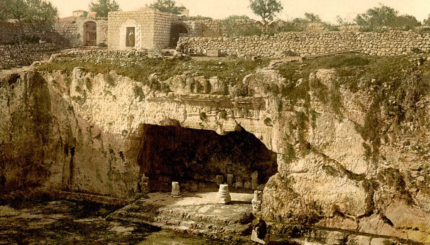Reprinted with permission from Jewish Magic and Superstition (University of Pennsylvania Press).
The anomalous position of the Jew in the modern world is but a latter-day versionof the fate that has dogged his footsteps ever since he wandered forth among strange and hostile peoples. In no time and place, however, was his status–and his plight–so manifestly unique as in medieval Europe.
Medieval Anti-Semitism
The essence of that uniqueness lay in his ambiguous relationship to the Christian society in which he led his precarious existence, on the one hand influenced by all the objective forces which molded his environment, on the other, shut off from that environment by insurmountable walls of suspicion and animosity. His willful persistence in his religious and cultural “difference” from the intolerant Christian civilization of the day, the dogmatic enmity fosteredby the Church, his minority status coupled with an effective economic competition with his non-Jewish neighbors, all these combined to create an attitude of envy and hatred.
But these alone do not tell the whole story; we must admit a further element intothe psychological complex which determined the attitude of Christian toward Jew–an element which today has lost its force in the composition of anti-Semitism, but which in the Middle Ages loomed very large. For it contributed the emotion offear, even of superstitious dread, in an age when superstition was the prevailing faith not alone of the masses, but of many of their leaders as well.
Satan & the Jews
Sorcery was a very real and terrifying phenomenon in those days, and many medieval Christians looked upon the Jew as the magician par excellence. The allegiance to Satan, attributed to Jews with an insistence that almost drowned out its true implication, was not merely a form of invective or rhetoric. Satan was the ultimate source of magic, which operated only by his diabolic will and connivance.
Christian writers make it quite clear that this is the connection to which they refer. Secularand religious authorities took action time and again against the Jews expressly on this count, and the Inquisition occasionally availed itself of the charge toget around the restrictions of ecclesiastical law which excluded the Jew fromits legitimate hunting grounds.
The masses also were quick to seize the opportunity afforded by this accusation,and mass attacks upon the Jews frequently followed the leveling of the charge.To cite but one instance: the most violent mob assault upon Jews in England,which overwhelmed every major Jewish community and took a tragic toll of martyrs, had its inception at the coronation of Richard I in London on September 3, 1189.
Onthat occasion a Jewish delegation bearing gifts and pledges of allegiance wasdriven from the palace, publicly accused of having come to cast their enchantments over the newly crowned king, and was set upon by the crowd; the outbreak spread rapidly through the city and the land, took more than half a year to spend itself and left in its wake a trail of horrible butcheries. Such manifestations, in greater or lesser degree, were the usual concomitant of a like accusation.
Suspicion of Jewish Customs
The striking feature of the Christian apprehension of Jewish sorcery is that itadhered not to certain specific Jews, who had aroused it by their actions, but rather to the entire people, en masse. Consequently every innocentJewish act which by its strangeness laid itself open to suspicion was considered a diabolical device for working magic against Christians.
The custom of throwing a clod of earth behind one after a funeral brought a charge of sorcery in Paris, in the early years of the 13th century, which might have haddire consequences if a certain Rabbi Moses ben Yehiel had not succeeded inpersuading the king of its utterly harmless character. The practice of washing the hands on returning from the cemetery aroused the same suspicions of sorcery and provoked some bloody scenes.
Impact on Jewish Practices
Soonerous did these recurrent accusations become that the rabbis of the Middle Ages found it necessary–forced to this step, no doubt, by Jewish publicopinion–to suspend some of these customs. In the case of the clod-throwing, though “many were obliged to disregard the usage for fear that theGentiles would accuse them of sorcery,” custom was proof against fear.
Butin other instances, fear triumphed. The mourning rites of “binding the head” and “overturning the bed” lapsed during the Middle Ages for this reason. In talmudic times fear of the same accusation had led Jewish authorities to excuse the head of the household from the rite of “searching out the leaven” on the eve of the Passover in places owned in common witha non-Jew; during the Middle Ages there was a strong but unsuccessful agitation to suspend this rite altogether, even indoors, “because we have Gentile serving-girls in our homes” who might spread the alarm.
In Provence, however, the ritual cleansing of the public oven in preparation for Passover baking was neglected “because of the Gentiles’ suspicion of sorcery.” When a fire broke out in a Jewish house its owner dared expect little mercy from the mob, for he was a sorcerer seeking to destroy Christendom, and his punishment was commonly simultaneous with his crime. The rabbis of the time were therefore unusually tolerant about violations of the prohibition to put out fires on the Sabbath and on the Day of Atonement. At the slightest danger they set this prohibition aside, “for this is a matter of life and death, since they accuse us and persecute us.”
Weread of a lamb, slaughtered in fulfillment of a ritual obligation, which was cut up and buried secretly in sections, “so that the matter may not become known and they say, ‘it was done for magical ends.'” To such measures were Jews driven by fear of arousing the suspicions of their neighbors.
When Vice Becomes Virtue
Jews were stoned as sorcerers. But it needs little knowledge of human nature to believe that the very vice became a virtue when Christians themselves had need of a little expert magic on the side. If Jews were magicians, their every act a charm, then their magic devices could aid as well as harm.
Rabbi Isaac ben Moses of Vienna, in the 13th century, tells that once when he was in Regensburg over a holiday, “a Gentile who had much power in the city fell dangerously ill, and ordered a Jew to let him have some of his wine, or he would surely die; and I gave this Jew permission to send him the wine (although it was a holiday) in order to prevent trouble, though there were some who disagreed and forbade this.”
Apparently Jewish wine possessed occult healing powers; perhaps this Gentile had in mind wine that had been blessed by Jews. It would be interesting to know how effective the cure was but Rabbi Isaac carries his anecdote no further.
The mezuzah (a biblical inscription attached to the doorpost) was also an object of suspicion, and at the same time, of desire. That it was regarded as a magicaldevice by Christians we know, for a fifteenth-century writer admonished hisreaders to affix a mezuzah to their doors even when they occupied a house owned by a non-Jew, despite the fact that the landlord might accuse them of sorcery.
Indeed, the Jews in the Rhineland had to cover over their mezuzot, for, as a 13th-century writer complained, “the Christians, out of malice and to annoy us, stick knives into the mezuzah openings and cut up the parchment.” Out of malice, no doubt–but the magical repute of the mezuzah must have lent special force totheir vindictiveness.
Yet even Christians in high places were not averse to using these magical instruments themselves. Toward the end of the fourteenth century the Bishop of Salzburg asked a Jew to give him a mezuzah to attach to the gate of his castle, but the rabbinic authority to whom this Jew turned for advice refused to countenance so outrageous a prostitution of a distinctively religious symbol.
Magic & Medieval Healing
In the field of medicine in particular was the reputed Jewish magical skill calledupon to perform miracles. According to the popular view, demons and magic were often responsible for disease, and medicine was therefore the legitimate province of the sorcerer.
Jewish physicians, though by no means free from the general superstitious attitude, were among the foremost representatives of a scientific medicine in the Germanic lands. Their wide knowledge of languages, the availability of Arabic-Greek medical works in Hebrew translation, their propensity for travel and study abroad, their freedom from the Church-fostered superstition of miraculous cures, relics, and the like, often conspired to make of them more effective practitioners than their non-Jewish competitors.
Paradoxically, their scientific training, such as it was, made them superior magicians in the popular view, and every triumph of medical science enhanced the Jew’sreputation for sorcery.
With your help, My Jewish Learning can provide endless opportunities for learning, connection and discovery.
mezuzah
Pronounced: muh-ZOO-zuh (oo as in book), Origin: Hebrew, a small box placed on the right doorpost of Jewish homes. It contains a parchment scroll with verses from the Torah inscribed on it, including the Shema prayer (Deuteronomy 6:4-9, 11:13-21).



